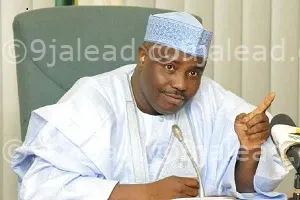Senator Aminu Tambuwal recently faced backlash for criticizing politicians who defected to the All Progressives Congress (APC). The ruling party dismissed his remarks, arguing that the Peoples Democratic Party (PDP) is struggling due to internal trust issues rather than external influences....CLICK HERE TO CONTINUE READING.>>
According to report from The Nation, APC National Secretary Senator Ajibola Basiru, asserted that the party remains open to welcoming defectors from opposition parties. He noted that while PDP may find these defections painful, they will persist as long as the party fails to resolve its internal conflicts. Basiru also emphasized that Tambuwal lacks an understanding of why politicians are leaving PDP, attributing the trend to Nigerians’ belief in the policies of President Bola Tinubu’s administration. According to Basiru, the APC is gaining strength due to the successful implementation of Tinubu’s Renewed Hope Agenda, which is delivering reforms across key sectors.
Thank you for reading this post, don't forget to subscribe!Felix Morka, APC’s National Publicity Secretary, echoed this sentiment, stating that defectors are drawn to the APC by the administration’s accomplishments. He pointed out that prominent figures from PDP, the Labour Party, and the New Nigeria Peoples Party (NNPP) have defected to APC across several states, including Kano, Kaduna, Enugu, Osun, Ebonyi, Delta, and Katsina. In Kano, numerous opposition figures have joined APC due to aggressive mobilization efforts, while in Kaduna, Governor Uba Sani recently welcomed thousands of new members.
Tambuwal, however, criticized these defectors, arguing that politicians with integrity would not join the ruling party given the current economic difficulties. Speaking in Kaduna after the Northwest PDP National Executive Council (NEC) meeting, he claimed that those leaving PDP were motivated by personal gain rather than public interest. He described the APC’s economic policies as detrimental to Nigerians and suggested that the ruling party’s only appeal lies in providing personal benefits, what he termed “stomach infrastructure.”
Basiru dismissed Tambuwal’s remarks, labeling him an inconsistent politician with no solid political principles. He asserted that Tambuwal’s political history shows a pattern of opportunistic moves, making his criticisms unworthy of serious consideration. He further claimed that PDP is riddled with crises, making it an unattractive choice for serious politicians.
Morka reinforced this view, describing Tambuwal as a “notorious and vainglorious party defector.” He detailed Tambuwal’s political journey, highlighting his numerous defections between different parties over the years. According to Morka, Tambuwal’s past actions suggest that he himself pursued political survival rather than ideological consistency. Morka also countered Tambuwal’s criticisms by citing the APC government’s economic progress, including increased oil production, rising foreign direct investments, and stock market growth.
Chief Hillard Etta, a former APC National Working Committee (NWC) member, criticized Tambuwal’s grasp of party politics, attributing PDP’s decline to poor leadership. Similarly, Chief Chekwas Okorie, former National Chairman of the All Progressives Grand Alliance (APGA), dismissed Tambuwal’s claims, arguing that political realignments are common. He pointed out that defections have historically shaped Nigerian politics, citing past PDP figures like Atiku Abubakar and Bukola Saraki who previously moved to APC.
Okorie added that party movements are not one-sided, as some APC members, including Nasir el-Rufai and others from the Northwest, have openly expressed dissatisfaction with the party. He suggested that ongoing political shifts indicate potential mergers ahead of the 2027 elections, reinforcing the dynamic nature of Nigerian politics.










